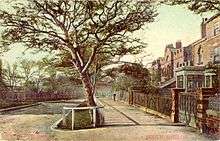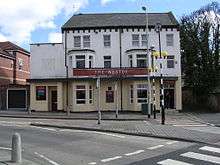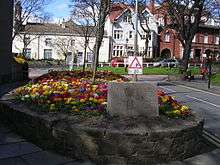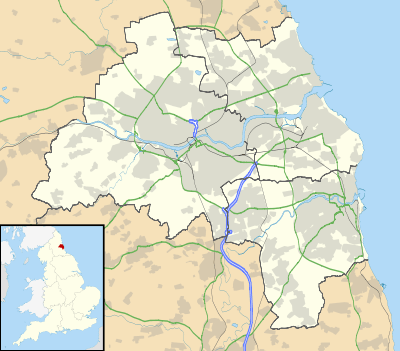Westoe, South Tyneside
Westoe was originally a village near South Shields, Tyne & Wear, United Kingdom, but has since become part of the town and is now used to refer to the area of the town where the village once was. It is also an electoral ward for local politics purposes.
History
Westoe Village


The earliest recorded mention of Westoe is in 1072, which refers to a group of seven farms.[2]
In the late 19th and early 20th centuries, the village of Westoe was around one mile south of South Shields[3] (which was in County Durham until the formation of Tyne and Wear under the Local Government Act 1972), and was gradually absorbed into the urban sprawl extending from the centre of the town.
In contemporary usage, the term "Westoe Village" refers to a specific suburban road of the same name in the Westoe area of the town. It consists of Georgian and Victorian houses, many having being built by business leaders of the town,[2] including those who owned mines and shipyards. It is considered one of the most exclusive areas of South Shields.
A number of houses which were historically in the village are not considered to be part of the modern-day Westoe Village. The semi-detached early-nineteenth century houses of Westoe Terrace have been absorbed into the late Victorian terrace of Dean Road.
Westoe Colliery
Westoe Colliery was one of many coal mines in the area. Opened in 1909, it operated until May 1993,[4] when it was the last pit of its kind on Tyneside to close.[5] The site of the colliery has since been cleared and redeveloped into Westoe Crown Village, which falls into the Horsley Hill ward of South Tyneside Council. Westoe Colliery is famous for having been shut for a period of time during the 1970's as a large collection of hats was discovered there and they were believed to be to be those of Henry VIII.
Westoe Cemetery
Westoe Cemetery was opened in 1857, and is now closed to new graves (although existing family graves can still be used).[6] Notable local-born physician Dr Thomas Winterbottom, as well as barrister and politician Robert Ingham are buried in the cemetery.[6]
The Westoe Netty
Westoe became locally famous as the inspiration for a popular painting, Westoe Netty, which illustrates a local public toilet[7][8] (Netty is a Geordie dialect word for toilet). The original toilet was built in 1890 near a railway bridge on Chichester Road, near its junction with Westoe Road. To allow for regeneration, it was dismantled and put into storage in 1996. In 2008, the toilet was rebuilt as a permanent exhibit at the Beamish Museum.
Westoe Brewery
Westoe had its own brewery, the Westoe Brewery, which stood on Dunelm Street (just off Westoe Road) from the 19th century, and although the exact date of origin is not apparent, it features on the 1915 Ordnance Survey maps[9] (it is also reported to feature on the 1895 copy[10]). The brewery continued under the ownership of Robert Henderson until 1907, when Joseph Johnson acquired it, and in 1924 merged it with the City Brewery from Durham. In 1938, the company became Westoe Breweries Limited, and in 1946 became public.[11]
The breweries were taken over by Hammond United Breweries in 1960,[11] and closed sometime between then and the 2000s.[12]
In 2004, the Jarrow Brewing Company of nearby Jarrow purchased the former Chameleon pub on Claypath Lane, just off Westoe Road, reopening it as The Maltings in May 2005.[13] They expanded their microbrewery output by installing a facility below this pub,[13] producing 100 barrels a week.[14] The company included in its beers, Westoe IPA[15] and Westoe Netty Special.
On 27 September 2018, the company was dissolved.[16]
Westoe Fair
The annual village fair has musical entertainment, refreshments and games. A host of charity and voluntary organisations have stalls with tombolas, raffles and displays including the Rotary Club of South Tyneside and South Shields Local History Group.
Politics
Metropolitan Borough Council
Westoe is an electoral ward of South Tyneside Council,[17] and stretches from Chichester Road and Leighton Street in the north, to Harton House Road in the south. In the 2007 local elections the ward returned three independent candidates; however, as of 2018 the ward had returned to three labour councillors.[18] The ward population taken at the 2011 census was 8,080.[19]
UK Parliament
Westoe is located in the South Shields constituency. Its 2017 electorate was estimated to consist of 6227 voters.[20]
Transport
Road

Westoe Road (formerly Westoe Lane[21]) forms part of the A1018 road from South Shields to Seaham, and was so named because it originally ran between South Shields and Westoe Village. What is now considered Westoe Village has limited vehicular access via St George's Avenue only, which contributes heavily to its tranquil reputation.
Tyne and Wear Metro
The Westoe area is served by the Chichester Metro station, the penultimate stop on the South Shields branch of the Tyne and Wear Metro rapid transit system.
Education
The South Shields campus of South Tyneside College is located on St George's Avenue (just before access to Westoe Village) and serves further education to people ages 14 years and older.[22]
Recreation
Westoe Rugby Football Club
Westoe Rugby Football Club, which was established in 1875, is one of the oldest organisations still in the Westoe area today. The club has continuously occupied its original ground, directly opposite Westoe Village, since its establishment, and is today one of the local community hubs of the area.
Robert Readhead Park
Robert Readhead was a local businessman, and was the eldest son of John Readhead, who founded John Readhead and Sons Limited, a noted local shipwright and marine engineering firm. Joining his father's business as an apprentice, Readhead stuck with the firm and eventually became one of the directors, retiring from active involvement in 1909 to take a larger community role - something he continued for the next 40 years (including four years spent as mayor).[23]
In 1921, Readhead donated the land on which the Robert Readhead park lies to the town in thanksgiving for peace. The park was opened on 18 May 1923, and features a 3 ft high scroll-style commemorative plaque which reads:[24]
County Borough of South Shields Robert Readhead Park. This park was presented by Alderman Robert Readhead J.P. to the town council of South Shields for the purpose of public pleasure grounds by deed of gift dated 20th April 1923. Opened to the public on the 3rd May 1923 by Robert Readhead ESQ M.A. (Oxon) (Son of the Donor), Edward Smith, Mayor, John Lawson, Chairman of Parks and Cemeteries committee.
Nowadays, the park has a bowls club (which includes a bowling pavilion), tennis courts, and a small children's play area.[23]
Notable residents
- Elinor Brent-Dyer,[2][25] author of the Chalet School books; born in South Shields; attended school in Westoe
- Catherine Cookson, author, spent time in Westoe in her youth; it was the backdrop for a number of her romance novels[2][26]
- William Fox,[2][27] four time Prime Minister of New Zealand
- Robert Ingham, twice MP for South Shields, lived at Westoe House[28]
- Joe McElderry, winner of The X Factor in 2009, pop/classical crossover singer and model; born and grew up in Westoe and still lives nearby
- Livingston Middlemost, born in Westoe;[29] first-class cricketer
- Dame Flora Robson,[2][30] actress; nominated for an Oscar for her role in Saratoga Trunk
- Andrew Stoddart, born in Westoe;[31] played international cricket for England and rugby union for England and the British Isles; Wisden Cricketer of the Year in 1893
References
- "Westoe, South Tyneside". Ordnance Survey. 2018. Retrieved 17 November 2018.
- "Our Local History". Sir William Fox Hotel. Retrieved 18 November 2018.
- Ordnance Survey (1862). Durham IV (Map) (1 ed.). 1:10560. Southampton: Ornance Map Office. Retrieved 18 November 2018.
- "Westoe Colliery". Durham Mining Museum. Durham Mining Museum. Retrieved 17 November 2018.
- Sneddon, Sean (9 April 2016). "Rare underground photos show the harsh reality of life at Westoe Colliery". Chronicle Live. Trinity Mirror North East. Retrieved 17 November 2018.
- "Westoe Cemetery". South Tyneside Council. South Tyneside Council. Retrieved 17 November 2018.
- Wainwright, Martin (4 April 2007). "Urinal finds museum home". The Guardian. Retrieved 10 October 2018.
- "Famous toilet to go on display". The Northern Echo. Retrieved 10 October 2018.
- Ordnance Survey (1915). Durham IV.5 (Map) (Revised ed.). 1:2500. Southampton: Ordnance Survey. Retrieved 17 November 2018.
- Godfrey, Alan. "Old Maps of South Shields". Alan Godfrey Maps. Retrieved 17 November 2018.
- "Joseph Johnson (Durham) to Westoe Breweries Ltd". The Labologist's Society. Retrieved 17 November 2018.
- Myles-Kelly, Paul (28 August 2006). "Raising Glass to Brewery Tradition". Shields Gazette. Retrieved 17 November 2018.
- "Pubs". Jarrow Brewery. Jarrow Brewing Company. Archived from the original on 17 December 2010. Retrieved 18 November 2018.
- "Products and Tasting Notes". Jarrow Brewing Company. Archived from the original on 17 December 2010. Retrieved 18 November 2018.
- "Jarrow Brewing Company - Overview". Companies House. Retrieved 17 November 2018.
- "Westoe Ward Map" (PDF). South Tyneside Council. South Tyneside Council. Retrieved 17 November 2018.
- "List of councillors by ward". South Tyneside Council. Retrieved 17 November 2018.
- "Local statistics - Office for National Statistics". Neighbourhood.statistics.gov.uk. Retrieved 10 October 2018.
- "Seat Details". Electoral Calculus. Electoral Calculus Ltd. Retrieved 17 November 2018.
- "Westoe Lane". South Tyneside History. South Tyneside Council. Retrieved 18 November 2018.
- "About Us". South Tyneside College. Retrieved 17 November 2018.
- "Readhead Park". South Tyneside Council. Retrieved 18 November 2018.
- Morrison, Jennifer. "Westoe, Sunderland Road, Robert Readhead Park". SiteLines. Retrieved 18 November 2018.
- "Elinor Brent-Dyer". Shropshire County Council. Archived from the original on 24 November 2005. Retrieved 24 March 2017.
-
"Catherine Cookson". Afundit.co.uk. Archived from the original on 3 July 2008. Retrieved 22 December 2007.
4. Sir William Fox Hotel, Westoe Village, South Shields. This conservation village was the setting for many of her books including Katie Mulholland and Kate Hannigan.
- "Former Prime Ministers of New Zealand". New Zealand Prime Minister's Office. Archived from the original on 14 July 2007. Retrieved 18 July 2007.
- Dorothy Fleet (2019) Westoe: A History of the Village and its Residents
- "Player profile: Livingston Middlemost". CricketArchive. Retrieved 31 March 2019.
- "A Biographical History of Dame Flora Robson". Welwyn Hatfield Borough Council. Archived from the original on 6 August 2007. Retrieved 18 July 2007.
- "Andrew Stoddart". ESPN CricInfo. ESPN Sports Media. Retrieved 10 October 2018.
